Key takeaways:
- Smart health monitoring empowers individuals to make informed health choices through real-time data from wearable devices and apps.
- Home automation enhances daily life by increasing convenience, security, and efficiency in routines.
- Integrating health devices with smart home technology can optimize health monitoring and create a more conducive environment for wellness.
- The future of health solutions is interconnected, with potential developments in telemedicine and predictive analytics to improve proactive health management.
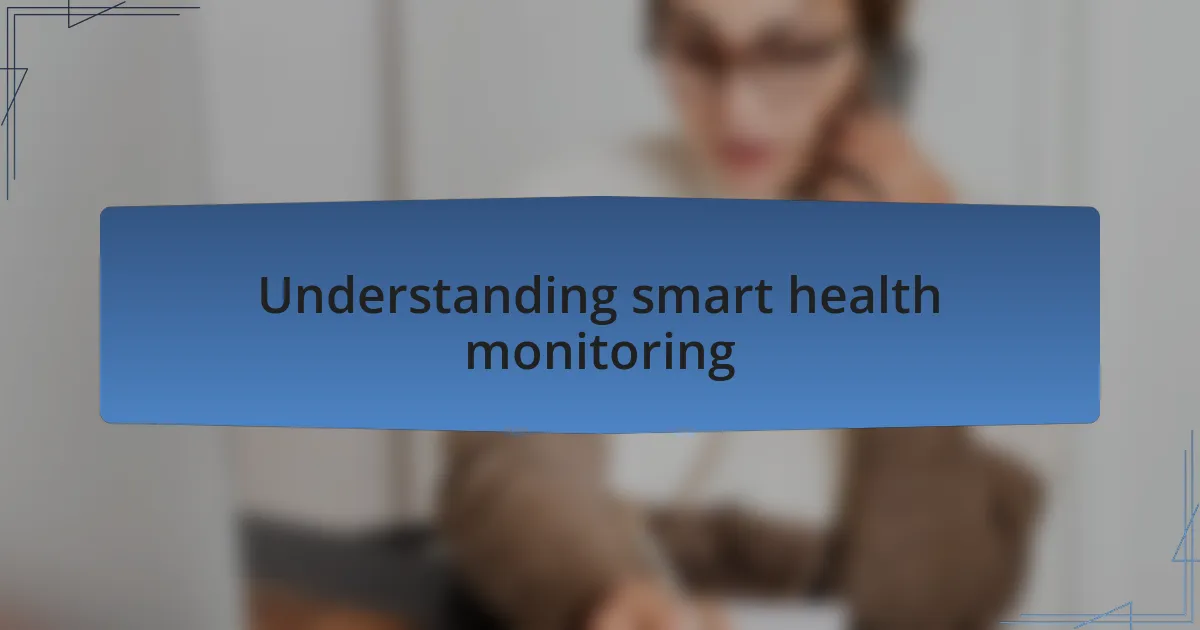
Understanding smart health monitoring
Smart health monitoring has become an essential part of modern living. I remember the first time I used a wearable device to track my heart rate during exercise—there was something reassuring about seeing real-time data on my wrist. This technology offers us a level of insight into our health that feels almost empowering; do you ever wonder how many people are making healthier choices because they have this information at their fingertips?
Understanding smart health monitoring means recognizing its potential to transform our approach to wellness. I felt a wave of relief when I started using a sleep tracker, learning how my lifestyle affected my rest. It opened my eyes to how interconnected our daily habits are with our overall health. Isn’t it fascinating how just a few taps on a screen can reveal patterns that weren’t obvious before?
At its core, smart health monitoring blends technology with personal well-being. I can’t help but think about how our grandparents might have approached health data if they had access to such tools. They often relied on intuition and basic check-ups, while today, we can analyze our vitals from the comfort of our homes. This shift begs the question: how can we leverage this technology to create a more proactive approach to our personal health journey?
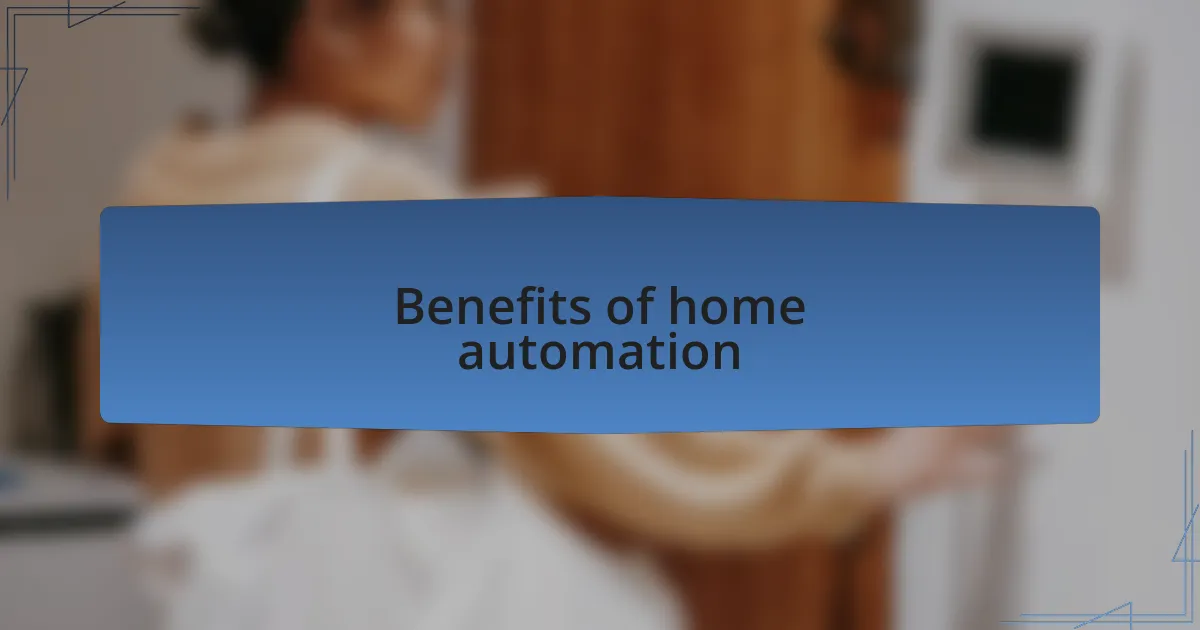
Benefits of home automation
Home automation offers a convenience that can dramatically enhance our daily lives. I remember installing a smart thermostat in my home; it not only kept my living space comfortable but also lowered my energy bills. It got me thinking—how many of us are missing out on substantial savings and ease just because we haven’t embraced this technology yet?
One of the most impactful benefits of home automation lies in its ability to increase security. After I set up smart cameras around my property, I found it reassuring to monitor them from my phone while away on vacation. It made me wonder: how does knowing that I can keep an eye on my home in real-time change the way I feel about leaving?
Moreover, home automation can significantly improve efficiency in daily routines. For instance, automating my coffee maker to brew at a specific time transformed my mornings. I could roll out of bed and enjoy a fresh cup without any extra effort, making me reflect on how small changes can pave the way for a more enjoyable start to the day. Isn’t it incredible how technology can create such seamless experiences?
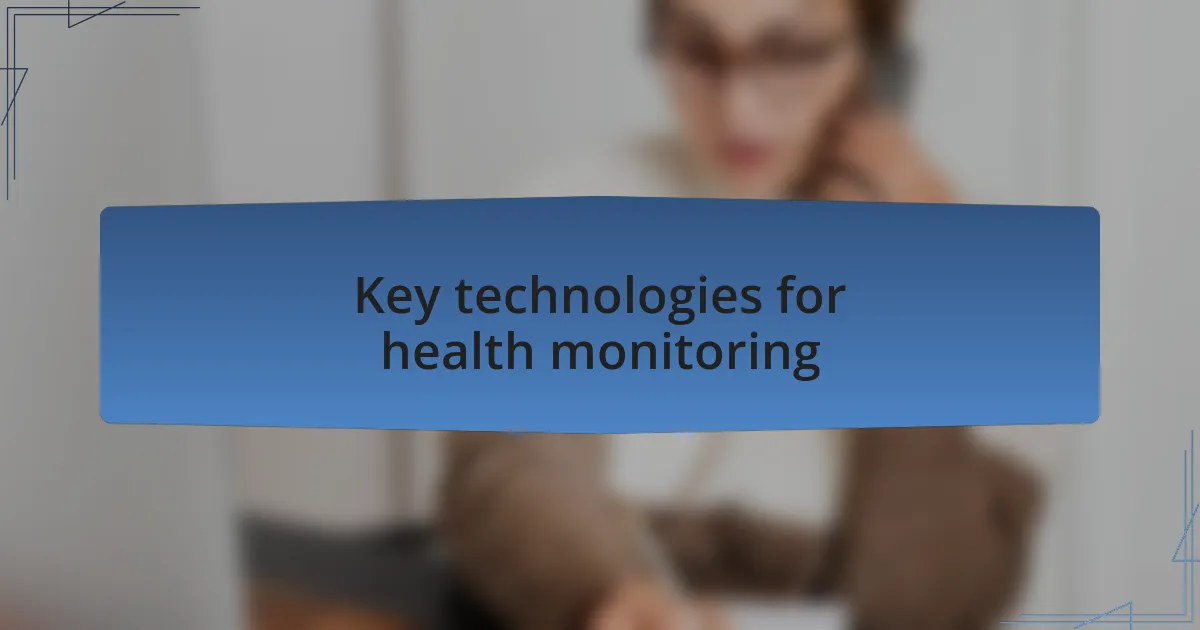
Key technologies for health monitoring
When it comes to health monitoring, wearable devices are at the forefront of technology. I remember the first time I strapped on a fitness tracker; it was eye-opening to see data on my steps and heart rate throughout the day. Have you ever thought about how this real-time feedback could motivate you to adopt healthier habits? It certainly did for me.
Telemedicine has also revolutionized the way we manage health. After my recent online consultation with a doctor, I appreciated how convenient it was to discuss my symptoms without traveling to a clinic. Isn’t it fascinating how this technology can bring healthcare directly to our living rooms, transforming how we think about managing our health?
Smart medical appliances, like blood pressure monitors and glucose meters connected to apps, further enhance care at home. I found it remarkably useful to track my readings over time on my smartphone; it added a layer of understanding and accountability to my health journey. Can you imagine how empowering this data-driven approach can be for managing chronic conditions?
![]()
Devices for smart health tracking
A variety of devices are available for smart health tracking, each designed to cater to different needs. For instance, I recently tried a smart scale that not only measures weight but also tracks body composition like muscle mass and hydration levels. Have you ever wondered how understanding these metrics can influence your fitness goals? It certainly opened my eyes to factors beyond just weight.
Fitness bands and smartwatches are another popular option, combining style with functionality. I personally enjoy the convenience of having notifications and health metrics like sleep patterns right on my wrist. It makes me wonder—how did we ever manage without this constant access to our health data?
Smartphone apps play a crucial role in health tracking as well, often paired with various devices for comprehensive monitoring. I’ve been using an app that logs my food intake and activity levels, and it even integrates with my wearable devices. It’s incredible to think about how anyone can now have a mini health assistant in their pocket, isn’t it?

Personal experience with health tech
When I first started using a fitness tracker, I was baffled by how many details it provided. Just seeing my heart rate fluctuate through the day made me realize how stress and activity levels impacted my overall well-being. Have you ever felt your pulse quicken with excitement or anxiety? It truly made me more mindful about my emotional health and how it ties into my physical state.
I also experimented with a sleep tracking app after struggling with restless nights. The insights I gained about my sleep cycles were eye-opening; I discovered I was spending too little time in deep sleep. Who knew that my evening routine could have such a profound effect on my rest? That realization prompted me to make small adjustments, like limiting screen time before bed, and I was amazed at how much better I felt.
One of the most gratifying experiences has been using my smartwatch during workouts. It not only tracks my performance but also encourages me to push beyond my limits. I often find myself asking: how far can I really go? This technology pushes me to pursue my fitness goals more rigorously, reminding me that every step, every heartbeat, is a part of a larger journey towards health.
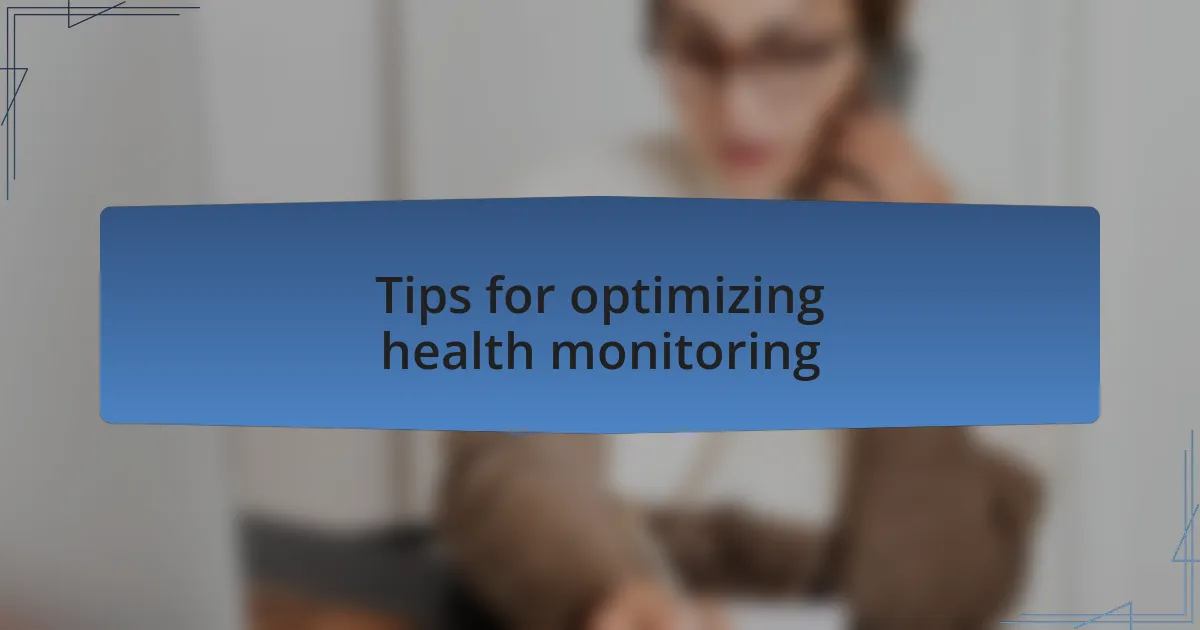
Tips for optimizing health monitoring
To truly optimize health monitoring, I recommend setting specific goals for your health data. For example, I once aimed to increase my daily step count to 10,000. By tracking this goal through my fitness app, I felt a sense of achievement each time I reached it. Have you ever noticed how a clear target can transform your motivation?
Another tip I found effective is leveraging the reminders and alerts built into many health monitoring devices. I sometimes forget to hydrate during busy days, but my smartwatch nudges me to drink water regularly. This simple reminder can make a significant difference in how refreshed and energized I feel throughout the day. How often do you find yourself waiting too long between sips?
Lastly, don’t overlook the power of integrating your health devices with other smart home technology. When I connected my sleep tracker to a smart light system, it tailored my environment for better rest. The lights dimmed as it detected my bedtime routine, creating a calming atmosphere. Have you thought about how your home environment affects your health monitoring? A little adjustment can drastically enhance your overall wellness experience.
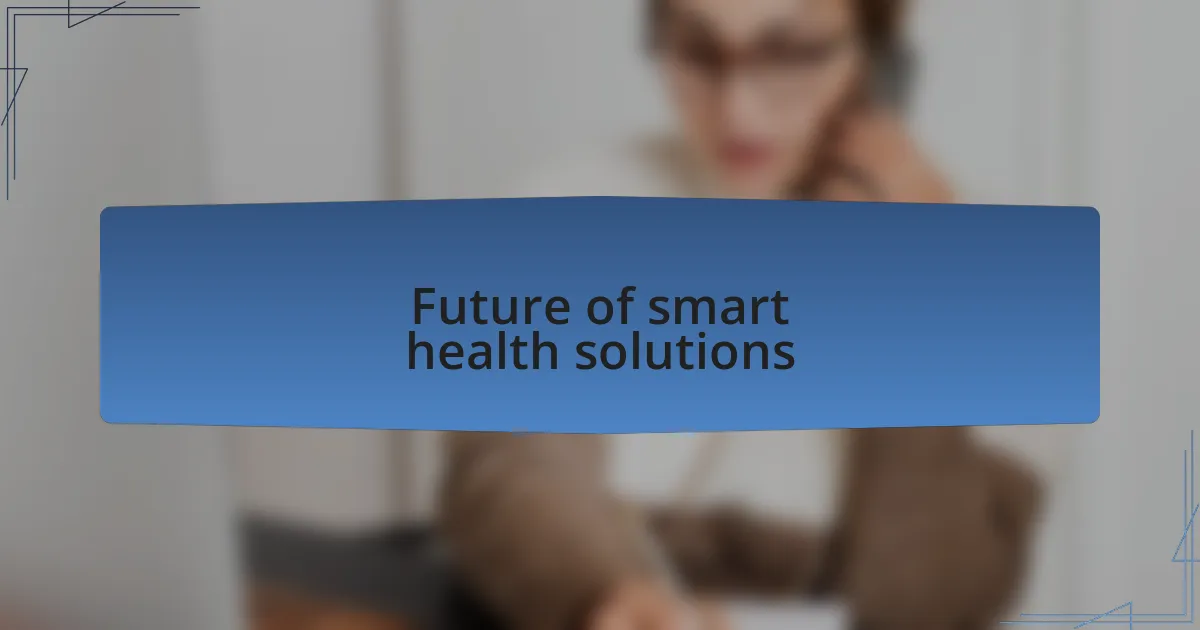
Future of smart health solutions
The future of smart health solutions is increasingly interconnected, creating an ecosystem where our devices communicate seamlessly. I envision a scenario where your wearable device not only tracks your heart rate but also informs your coffee machine to reduce caffeine levels if it detects increased stress. Have you ever thought about how these tiny adjustments could lead to a more balanced lifestyle?
Moreover, I imagine a world where telehealth becomes a standard part of our healthcare system, powered by real-time monitoring. Just last month, I had a virtual consultation with my doctor who could view my health metrics instantly. It made the experience more personal and relevant, bridging the gap between technology and individual care. How soon do you think we will rely more on these digital connections than face-to-face visits?
As artificial intelligence continues to advance, predictive analytics in health solutions may allow us to not only track but also anticipate health issues before they arise. I often find myself wondering how much more control we could have over our health if devices could preemptively suggest lifestyle changes based on data trends. Doesn’t the prospect of living with enhanced awareness and anticipation sound exciting?